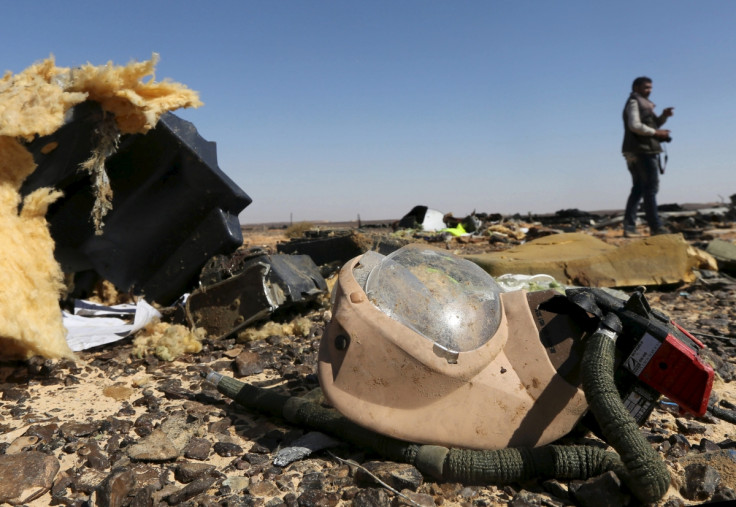Sinai plane crash 'caused by impact' says Russian airline Metrojet

A Russian airline has blamed external factors for the deadly crash of one of its planes in Egypt. Officials at Kogalymavia, also known as Metrojet, have denied the Airbus A321 broke up in mid-air because of a technical fault.
Metrojet's deputy general director Alexander Smirnov said only a "mechanical impact on the plane" could have caused it to go down on 31 October. Flight 7K9268 from the Red Sea resort of Sharm el-Sheikh to St Petersburg crashed in the Hassana area of the restive Sinai peninsula, killing all 224 people on board.
Smirnov told reporters in Moscow the aircraft abruptly lost speed and altitude shorty before disappearing from flight radars 23 minutes after take-off.
The jet was cruising at about 31,000 feet, when, in one minute, it lost 5,000 feet and of 300 kph (186 mph) in speed, according to Smirnov. The crew "totally lost control" and was not able to radio aviation authorities.
Metrojet's deputy CEO Viktor Yung told Russian news agency Tass: "The plane went out of control. It was not flying. It was falling".
Passengers were mainly Russian tourists on their way back from a winter sun break. Hours after the disaster, the Islamic State (Isis) claimed it had downed the plane in response to Russia's military intervention in Syria.
IS local offshoot is leading an Islamist insurgency in northern and central Sinai but its claim of responsibility was initially dismissed by both Russian and Egyptian officials. Russian transport minister Maxim Sokolov said it was a "fabrication".
Analysts said IS Egyptian branch, a militant group previously known as Ansar Beit al-Maqdis and successfully renamed only as Sinai Province, doesn't have the capability to shoot down aircraft travelling at high altitude. Several airlines, including Emirates, Lufthansa and Air France-KLM have nevertheless said they will not fly over the area until reasons for the crash are clear.
Investigators said evidence indicates the aircraft broke up in mid-air but have refrained from suggesting possible causes for the incident. Aviation experts have speculated a technical failure or an explosion could have brought it down, with the first option being initially the most credited.
Doubts were raised about Metrojet's reassurance that the aircraft was in good shape. Russian media quoted the wife of co-pilot Sergei Truckahev as saying her husband had complained the plane's technical conditions were far from optimal, leaving "much to be desired".
Other reports said the crew had complained about repeated engine failures in recent weeks. Put into service 18 years ago, the A321 suffered damage to its tail during a difficult landing in Cairo in 2001.The airline, however maintained all damage had been repaired and the aircraft was good to fly.
It also excluded a human error could have caused the incident, describing the captain Valery Nemov as an "experienced" pilot with more than 12,000 air hours on the clock, including 3,860 flying A321s.
More details will be provided to investigators by the flight's black boxes that are being examined and are in a good condition, according to Russian officials.
© Copyright IBTimes 2025. All rights reserved.




















